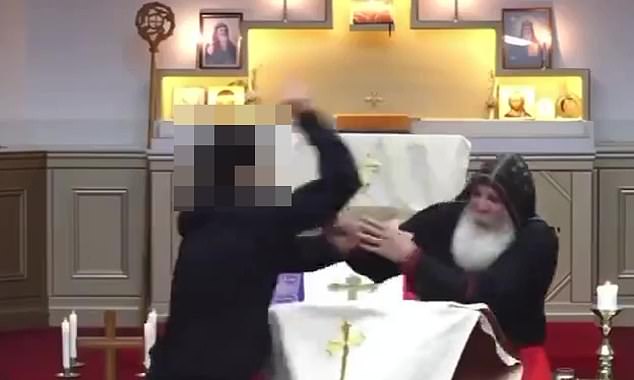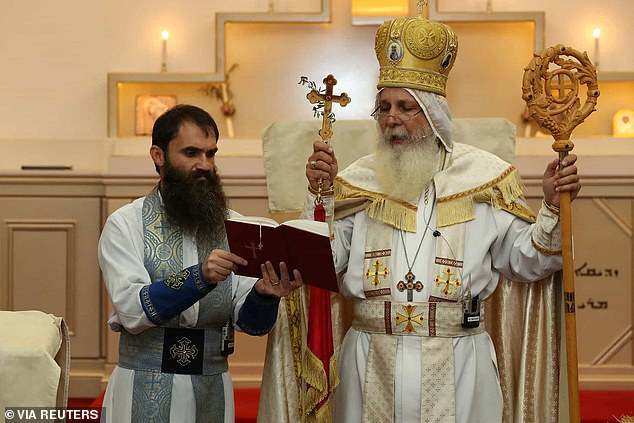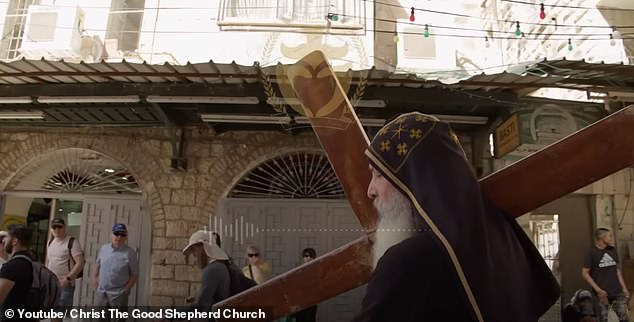A bishop who was allegedly stabbed by a teenager during a livestreamed sermon has condemned the “political” decision to issue an order for videos of the incident to be removed from social media.
Bishop Mar Mari Emmanuel was preaching at Christ the Good Shepherd Church in Wakeley, in Sydney’s southwest, on April 15 when a 16-year-old boy approached the altar and allegedly stabbed him repeatedly.
The boy has been accused of committing a terrorist act.
Following the incident, Australia’s eSafety Commissioner Julie Inman-Grant ordered X, formally known as Twitter, and Meta, which owns Facebook and Instagram, to remove the images.
Meta complied with the order, but X objected, prompting Ms Inman-Grant to take the matter to the Federal Court.
Judge Geoffrey Kennett granted an interim order forcing X to hide any publications showing the images until a full hearing on May 10.
But in a slickly produced 11-minute video posted online Thursday, the bishop said the alleged attack against him should not be used for political purposes and that he supports freedom of expression and religion, is against censorship and that the videos should remain posted.
‘I acknowledge the Australian Government’s desire to remove the videos due to their graphic nature. “I do not condone any act of terrorism or violence,” Bishop Emmanuel said of images of him walking along the Via Dolorosa in Jerusalem.
The Federal Court on Monday night ordered social media giant X, formerly known as Twitter, owned by Elon Musk, to block all users around the world from viewing the images. Mr. Musk appears in the photo.

Bishop Mar Mari Emmanuel (pictured right) has asked that footage of the alleged stabbing remain online.
The Via Dolorosa is the path that Jesus was forced to travel while carrying a cross on the way to his crucifixion; Bishop Emmanuel is seen carrying a cross on the same processional route, accompanied by his followers.
“However, taking into account our divine right to freedom of expression and freedom of religion, I am not opposed to the videos remaining on social media,” the bishop said in voice-over.
He added that “it would be very worrying if people used the attack against me to serve their own political interests and control freedom of expression.”
X’s Australian lawyers have detailed an affidavit from Bishop Emmanuel giving his permission for the content to be shared and remain online.
“There has recently been an affidavit… from Bishop, the victim of the attack, stating that he strongly believes that the material should be made available,” lawyer Marcus Hoyne told the Federal Court during a brief hearing on Wednesday.

Pictured are the parish priest, Father Isaac Royel (left) and Bishop Mar Mari Emmanuel (right), who suffered stab wounds.
He said his client would submit substantial material challenging the orders and the “exorbitant jurisdiction” claimed by the online safety watchdog.
Blocking clips of the alleged stabbing of Bishop Emmanuel for Australian internet users was enough, X argued.
The bishop used his YouTube video to forgive “whoever is behind this.”
“My prayer goes out to the person who committed this act,” he said.
“I will always love this person… He is my son and will always be my son, he will always be in my heart, in my prayers and in my thoughts.”
He also said he was praying for Prime Minister Anthony Albanese, Israel and Palestine.

Bishop Mar Mari Emmanuel (pictured) was preaching at Christ the Good Shepherd Church in Wakeley, south-west Sydney, on April 15 when a 16-year-old boy approached the altar and allegedly stabbed him repeatedly.
Following the bishop’s stabbing, a crowd began rioting outside Wakeley church when around 2,000 people attended, injuring dozens of police officers.
On Monday, New South Wales police began circulating images of people wanted for questioning. Five people have since been charged with crimes.
On Wednesday, more than 400 officers were involved in extensive searches in Sydney and Goulburn as part of a counter-terrorism investigation linked to the stabbing of the religious leader.
Police arrested five teenagers, aged between 14 and 17, who were later charged with terrorism offences.

